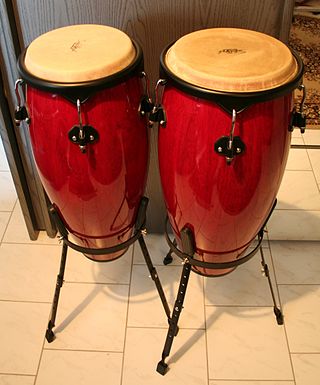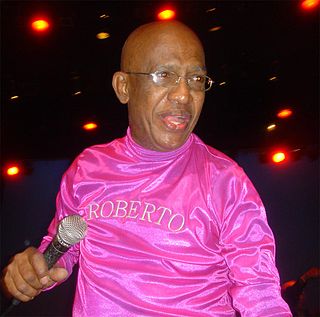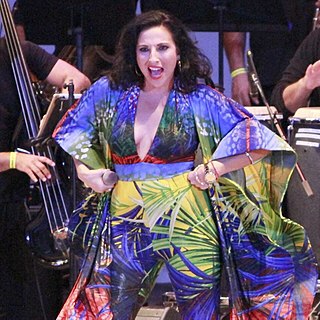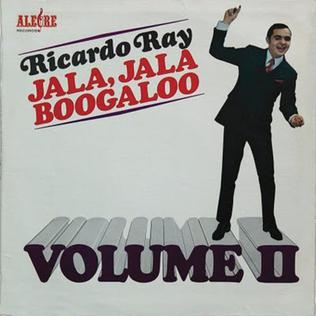
Salsa music is a style of Caribbean music, combining elements of Cuban, Puerto Rican, and American influences. Because most of the basic musical components predate the labeling of salsa, there have been many controversies regarding its origin. Most songs considered as salsa are primarily based on son montuno and son Cubano, with elements of cha-cha-chá, bolero, rumba, mambo, jazz, R&B, bomba, and plena. All of these elements are adapted to fit the basic Son montuno template when performed within the context of salsa.
Boogaloo or bugalú is a genre of Latin music and dance which was popular in the United States in the 1960s. Boogaloo originated in New York City mainly by stateside Puerto Ricans with African American music influences. The style was a fusion of popular African American rhythm and blues (R&B) and soul music with mambo and son montuno, with songs in both English and Spanish. The American Bandstand television program introduced the dance and the music to the mainstream American audience. Pete Rodríguez's "I Like It like That" was a famous boogaloo song.
Héctor Juan Pérez Martínez, better known as Héctor Lavoe, was a Puerto Rican salsa singer. Lavoe is considered to be possibly the best and most important singer and interpreter in the history of salsa music because he helped to establish the popularity of this musical genre in the decades of 1960s, 1970s and 1980s. His personality, style and the qualities of his voice led him to a successful artistic career in the whole field of Latin music and salsa during the 1970s and 1980s. The cleanness and brightness of his voice, coupled with impeccable diction and the ability to sing long and fast phrases with total naturalness, made him one of the favorite singers of the Latin public.

Roberto Roena Vázquez was a Puerto Rican salsa music percussionist, orchestra leader, and dancer. Roena was one of the original members of Cortijo y su combo and later with El Gran Combo de Puerto Rico. He later became the leader of his own band, "Roberto Roena y Su Apollo Sound", widely considered one of the best Latin salsa bands in Puerto Rico. Roena had also been a long-time member of the Fania All Stars, a salsa supergroup that has enjoyed worldwide success since the 1970s.
Ricardo "Richie" Ray is a Nuyorican virtuoso pianist, singer, music arranger, composer and religious minister known for his success beginning in 1965 as part of the duo Richie Ray & Bobby Cruz. He is known as "El Embajador del Piano".
Raphy Leavitt was a Puerto Rican composer and founder of the salsa orchestra, La Selecta.
Glenn Monroig is a Puerto Rican composer, guitarist, and singer of various types of music styles, such as salsa, boleros and rumba. He is credited with having recorded the first rap song in Spanish.
Ismael Quintana was a Puerto Rican singer and composer of salsa music.

Gilberto Santa Rosa Cortés, nicknamed "El Caballero de la Salsa", is a Puerto Rican bandleader and singer of salsa and bolero. He is a six-time Grammy Award winner and has sold over three million records in the United States and Puerto Rico. Santa Rosa also starred in a comedy.

Víctor Manuel Ruiz Velázquez, known professionally as Víctor Manuelle, is a Puerto Rican salsa singer, known to his fans as El Sonero de la Juventud. He is identified primarily with salsa romántica or "salsa monga". Víctor Manuelle has neither recorded in English, nor made a Latin pop album, nor ventured into acting, preferring to remain a musician grounded within salsa music.

Catalino "Tite" Curet Alonso was a Puerto Rican composer of over 2,000 salsa songs.

Melina Almodóvar, also known as La Muñeca de la Salsa and La Chica Del Bling, is a Puerto Rican salsa singer, songwriter, dancer, and entertainer. Known for her high-energy performances and salsa dancing skills, she combines old-school salsa moves with contemporary styles of dancing and singing. She established the Orquesta Caliente salsa orchestra in the Southern United States.
Cruz Manuel Hernández Santiago, known artistically as Manny Manuel, is a Puerto Rican musician and singer of merengue, bolero, and tropical music. He became famous first as a member of the group Los Sabrosos del Merengue, before launching a successful solo career in 1994.
Richie Ray & Bobby Cruz are a Puerto Rican musical duo, consisting of Ricardo "Richie" Ray and Roberto "Bobby" Cruz. The duo was formed in 1963 and rose to fame in the mid-1960s. They are one of the most famous interpreters of 'salsa brava' music.

Jala Jala y Boogaloo is an album released by the salsa music duet Richie Ray & Bobby Cruz. Released in 1967, the album is influenced not only by Latin rhythms such as the Puerto Rican Jala Jala, but also by beat music.

Jala Jala Boogaloo Volume II is an album released by the salsa music duet Richie Ray & Bobby Cruz. Released in 1968, the album continues with the sound of its predecessor Jala Jala y Boogaloo, influenced by Latin rhythms such as the Puerto Rican Jala Jala, as well as by soul and Beat music.

El Bestial Sonido de Ricardo Ray y Bobby Cruz (The Bestial Sound of Ricardo Ray and Bobby Cruz) is the thirteenth studio album released in 1971 by the salsa music duet Richie Ray & Bobby Cruz. Released at the height of their popularity, the album inaugurated a new era in salsa with the inauguration of a new Fania Records subsidiary: Vaya Records. The album, notable for the inclusion of new elements into salsa such as classical music, was an international success, and its title track Sonido Bestial became one of salsa's most popular songs. The album consecrated Richie Ray as a prodigious pianist, capable of playing a fusion of several rhythms and styles.
José Juan Piñero González, better known as Pijuán, was a Puerto Rican musician who produced and/or has been credited on several albums under the record labels Phillips Borinquen, Hit Parade, Kubaney, Discos Melón, TH Records, Private Ranch Records and Musigol Records.
This article includes an overview of the major events and trends in Latin music in the 1970s, namely in Ibero-America. This includes recordings, festivals, award ceremonies, births and deaths of Latin music artists, and the rise and fall of various subgenres in Latin music from 1970 to 1979.
Juan “Juancito” Torres Velez, also known as "La Trompeta Nacional De Puerto Rico", was a Puerto Rican salsa and jazz trumpet player, composer, arranger, producer and musical director best known for his association with the Fania All-Stars from 1979 to 1985. He was known as a great soloist, specializing in upper register.







